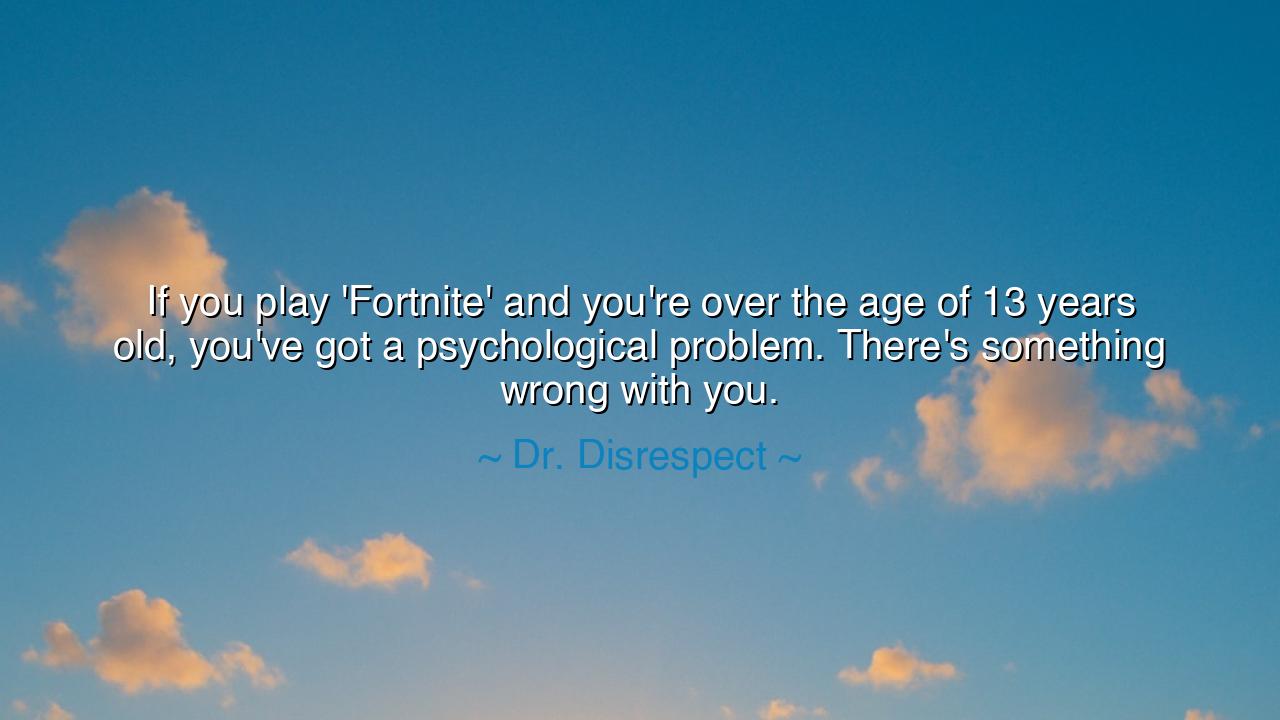
If you play 'Fortnite' and you're over the age of 13 years old
If you play 'Fortnite' and you're over the age of 13 years old, you've got a psychological problem. There's something wrong with you.






The words of Dr. Disrespect—“If you play ‘Fortnite’ and you’re over the age of 13 years old, you’ve got a psychological problem. There’s something wrong with you.”—resound not as a literal condemnation, but as a satirical cry against stagnation, against the temptation to linger in comfort when one should be striving toward mastery. Beneath his brash humor lies a sharper truth, one that echoes through the teachings of old: that immaturity unexamined becomes decay, and that clinging to childish pleasures while forsaking the pursuit of growth weakens both spirit and will. His words, though cloaked in jest, carry the pulse of an ancient challenge—to rise, to mature, to live intentionally, and not to lose oneself in the endless play of distraction.
Dr. Disrespect, born Guy Beahm, is no philosopher of marble halls or cloistered libraries. His pulpit is the digital age—the streaming arena, the coliseum of millions where identity and performance collide. When he mocks the grown player lost in Fortnite, he is not attacking the game itself, but the condition it represents: the surrender of purpose to endless entertainment. “Fortnite,” a realm of perpetual novelty and shallow triumphs, becomes a symbol of modern life’s seductions—comfort without challenge, motion without direction, pleasure without progress. His remark, half-serious and half-satirical, exposes a spiritual ailment of the times: the refusal to evolve.
In the ancient world, the poets and philosophers warned of this same peril. Seneca, the Roman Stoic, spoke of men who “busy themselves with trivialities and call it leisure.” He did not know of video games, but he knew of distractions—the dice players, the gossipers, the perpetual spectators of the amphitheater who mistook amusement for meaning. He, too, might have said, “If you play beyond your season, something within you has gone astray.” For every age of life carries its duties: the youth must learn, the adult must build, the elder must guide. To remain a child forever, chasing virtual victories, is to defy the rhythm of life and thus to lose one’s strength of soul.
Consider the tale of Alexander the Great, who by the age of thirty had conquered most of the known world. Yet he wept when told there were no more worlds to conquer. His spirit hungered perpetually for challenge, for motion beyond ease. Whether in kingdoms or in character, the same law applies: when one ceases to strive, the fire begins to dim. Dr. Disrespect’s warning, wrapped in laughter, calls modern men and women to rise above the endless games of distraction, to reclaim their power of focus and their hunger for real accomplishment. The wise understand that the danger is not in playing—but in never outgrowing the need to escape through play.
Yet his words should not be read as scorn for joy or imagination. For play itself, when disciplined, is sacred. It is through play that the child learns courage, through games that the warrior learns skill. Even in the ancient academies, philosophers played at debate, soldiers played at war, and poets played with rhythm and rhyme. But always the play was purposeful, a means toward mastery. What Dr. Disrespect mocks is not play—it is escape, the endless circling of a life that forgets to advance. To play without purpose is to drift like a ship that sails but never lands, whose captain mistakes motion for journey.
This is the sickness of our modern age: the spirit lulled by infinite amusement. The man who could build, create, or lead instead spends his days collecting virtual trophies, mistaking pixels for glory. The woman whose imagination could weave art or knowledge turns instead to the shallow scroll of digital worlds. The ancients warned of this under other names—sloth, distraction, acedia—the wasting of potential through idleness disguised as busyness. And so Dr. Disrespect’s harsh jest becomes prophetic: when the grown forget their power, when they settle for endless consumption rather than creation, they indeed fall into a kind of psychological sickness, one not of madness but of meaninglessness.
Let this, then, be the lesson: play should serve purpose, not replace it. To the young, take joy in your games—they train the reflexes of the mind and heart. But when the hour of maturity arrives, turn that same focus toward creation, toward building something lasting in the world. To the grown, remember that life’s true victories are not measured in leaderboards or digital crowns, but in the lives you shape, the virtues you forge, and the strength you cultivate in yourself.
And so, when Dr. Disrespect hurls his exaggerated decree, laugh—but also listen. Beneath the mockery beats the drum of an older truth: that time is sacred, and purpose is rare. The wise man plays to sharpen the mind, not to escape it. The strong man entertains himself only after he has earned his peace. For to live forever as a child in spirit is not innocence—it is refusal to become whole. Grow, strive, build—and let your play, like your life, serve something greater than itself.






AAdministratorAdministrator
Welcome, honored guests. Please leave a comment, we will respond soon